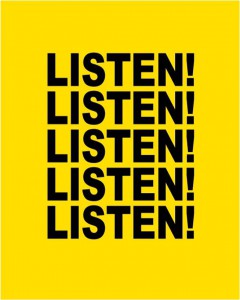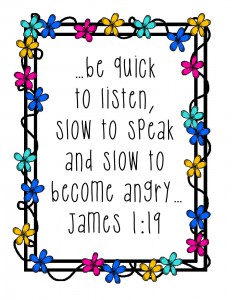 Most everyone wants to talk, express their thoughts and opinions. People have an innate need to be heard, listened to. Swiss psychiatrist Paul Tournier wrote, “It is impossible to overemphasize the immense need humans have to be really listened to, to be taken seriously, to be understood…” Therefore talking comes fairly easy. However, listening is an acquired skill.
Most everyone wants to talk, express their thoughts and opinions. People have an innate need to be heard, listened to. Swiss psychiatrist Paul Tournier wrote, “It is impossible to overemphasize the immense need humans have to be really listened to, to be taken seriously, to be understood…” Therefore talking comes fairly easy. However, listening is an acquired skill.
Maybe that’s why the Bible exhorts us to be quick to listen and slow to speak. (James 1:19) On the surface, it may appear this passage is just trying to protect us from a faux pas like putting one’s foot in one’s mouth. But if we dig deeper we know that simply holding one’s tongue is not listening. Listening requires not only restraint from speaking but also active, mental participation in what someone is saying. Listening connects us with others.
I must admit my listening skills are weak at best. Too often what people say drifts into a drone of “blah, blah, blah, blah, blah…” I look into their eyes, nod my head in compliance and whisper “uh-huh” a few times while I think about what I want for dinner. But that really isn’t listening, is it?
Consider this…There is a difference in faking interest and taking interest. Listening is a conscious choice. It’s a courtesy, yea verily, even an act of love we extend to others.
In its purest form, listening is a ministry. We minister to others by listening to them. We are giving them our time and our attention. We don’t have to offer solutions. In fact, many times people will come to conclusions about problems just by talking it through. Listening is a way of saying, “You are important to me. I value your opinion. I empathize with what you are going through.” Or in simpler terms, listening to others says, “I care about you!”
Suggestions for practicing this choice…
- Active listening requires you not be speaking. So perhaps you should shut your mouth and focus on the person talking. Give them your undivided attention. Do not let your eyes wander to the television set, the birds in the trees, or the text message on your cell phone.
- Resist the temptation to interrupt and insert your witty comments. Be patient.
- Be attuned to a person’s tone of voice, facial expressions and body language as well. Is he/she angry, happy, sad, concerned, frustrated, etc?
- When you are expected to respond, ask questions instead of offering solutions such as: What did you mean when you said…? What are your options…?
- Remember the person came to talk to you so the conversation should be more about him/her than you. However if you have a friend that only wants to talk, talk, talk and is not ever interested in what you have to say, consider getting a new friend.


